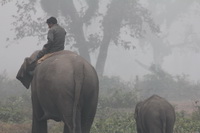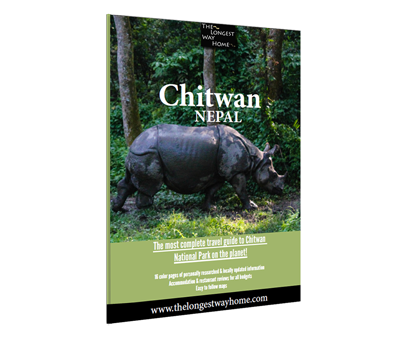

Is ethical elephant tourism different in Nepal compared to Thailand?
Yes, is the honest answer. But that still doesn’t make it right. Then again, without this form of elephant tourism Nepal wouldn’t have any elephants in the wild, or rhinos or tigers or possibly any forest.
While Thailand is making world headlines for its long running cruel elephant tourism industry along with tigers, dolphin and even human tourism (source) one must look at Nepal a little differently.
Elephants are a part of everyday life in Nepal. They are highly respected and accredited to helping save conservation parks and wildlife in Nepal.
Does that mean it’s okay to jump up on an elephants back and ride one?
What if there was an outright ban on elephants interacting with tourists in Nepal?

What is elephant tourism in Nepal?
Let’s take a look at how elephants are used in tourism in Nepal. You won’t find elephants being led down the streets of the capital city Kathmandu or the resort town of Pokhara. You won’t see elephants being taken into resorts and made to paint pictures or balance on giant swings.
You will find elephants predominantly at Chitwan National Park and in other conservation parks like Bardia. In Chitwan elephants can be hired out for one hour jungle safaris and for 20 minutes elephant baths twice per day. In other national parks they are used for conservation and breeding.
That’s it. No more.
So let’s back up at bit and go back to Chitwan National Park where elephants are a popular part of tourism.
Ethical Elephant tourism at Chitwan National Park?
Again, elephants are only used for bathing and 1 hour jungle rides in the buffer zone. In many parts of the world this would already be condoned. But before you lambaste Chitwan for this practice keep this in mind.
Without elephant tourism in Chitwan there would be no national park, tigers or rhinos.
Elephant tourism has been the key factor in not just financing the parks survival but also in financing the reintroduction of rare one-horned rhinos and Royal Bengal tigers in the area. Not to mention the breeding of elephants themselves.
Did you know that elephants are used by park rangers in Chitwan to patrol the area for poachers?
Did you also know that there’s been no poaching of rhinos now for 3 straight years? (source). In fact elephant, tiger and rhino populations in Nepal are one of the few rare places in the world where the populations are increasing!
Staying ahead of the game

While Thailand battles to get drugged tigers out of monks hands at the Tiger Kingdom and to stop the circus like elephant rides that kill tourists Nepal is silently making strides on humane and ethical elephant tourism.
A few weeks ago I was in Nepal updating my guidebook to Chitwan when I met with the new president of the United Elephant Cooperative Deepak Bhattarai. I’ve known Deepak for quite a few years now and was delighted to hear he’s taken on this leadership role. Already within the past few months he’s helped initiate a 70% change in policies.
How elephant tourism is changing in Chitwan

Deepak has overseen some radical changes which now means that there are no more chained up private elephants during the day in Chitwan. Yes, bull elephants are still chained as they are otherwise uncontrollable if there are females around.
Keep in mind that bull elephants also come in from the wild at night too so there’s an ongoing need to protect both villages and other elephants alike.
Mahouts are no longer allowed to use metal hooks on elephants. Now only wooden sticks are allowed.
Elephant jungle safaris only happen twice per day for each elephant. Previously they would be used up to 5 times per day.
Two baby elephants have already been successfully raised using non-traditional methods. In other words the traditional methods of beating a calf and keeping it from its mother to “break it in” is no longer the preferred method in Chitwan.
However, on my visit to Sauraha in 2017 I learned that this method has not been a full success as the elephants constantly need “treats” to behave. Thereby encouraging an unhealthy diet. Locals are also objecting to how horses are broken in yet activists are not not protest about this issue.
Deepak has also introduced a “Mahout of the year” contest for the mahout who looks after his elephant the best using these new methods throughout the year. This has proven to be very popular.
My questions to Deepak started with the little known. Why was this happening without the pressure of international animal rights groups?

Deepak replied that they know the future and wanted to be ahead of the game so to speak, “We actually invited animal rights groups and the WWF here.”
While Nepal is leading the way in new elephant rights Deepak is also deeply frustrated with two aspects since inviting organisations to visit them.
“No matter what we do animal rights activists are never happy. We are years ahead of places like Thailand and still they want an outright ban on elephants with tourists here.”
Deepak has challenged the animal rights groups to come up with a way to fund the national park, to give the Mahouts a new livelihood, to look after the elephants and pay for their feeding and medical expenses. And, to help patrol the national park. He has been met with silent suggestions.
He also challenged them to deal directly with the government. “The animal rights groups constantly accuse private elephant owners of cruelty. Yet it is us who have made elephants chain-free and have introduced cruelty free elephant training. The government elephants are still chained and use traditional breaking in methods. We challenge them to deal with the government directly. But they don’t, because the government refuse to deal with them directly. So they keep coming back to us.”
In 2017 Deepak offered to take a group of these activists to Thailand where they said they have already implemented some of their strategies successfully so local Nepali elephant owners can see for themselves. The activists have so far refused his offer. I must also say, I have not seen nor heard of successful elephant “training” programs in Thailand either!
Animal rights activists running amok?

The international animal rights groups seem to be running in a similar vein to many humanitarian organisations who use their “international methodologies” to push change in Nepal. All the while missing out on the very vital point that Nepal is not the same as Thailand nor Kenya. You simply cannot just rush into a country and demand changes based on what works somewhere else.
A prime example is an earthquake response advisory used by a well-known aid organisation in Nepal. It stated that during an earthquake people should take shelter under tables. During one aftershock one local village is said to have done this and run in from outside. The mud houses collapsed and killed many. The advisory was incorrect for a ground floor house made of mud in Nepal.
Likewise what works in Nepal for elephant conservation may not work in Thailand or Kenya or vica versa.
What works in Nepal is that elephant, rhino and tigers numbers are increasing (source). People like the United Elephant Cooperative are implementing fundamental changes by themselves.
Much like Deepak said, perhaps the animal rights activists would be better if they vented their anger at the Nepalese government for not implementing changes or even agreeing to meet with them?
Instead many “western” organisations ask for donations to fund their yearly trips to Nepal just in time for the yearly elephant festival where they stage protests and disrupt the festivities.
These same animal rights organisations seem to have no problem in promoting specific high-end resorts with Hollywood connections who then house them. Perhaps some donor investigations and their expenses also need to be looked at?
Should you ride an elephant in Nepal?
An ethical question. If you ride an elephant are you helping or harming the elephant?
I look at it like this. In Thailand I wouldn’t go near an elephant. I’ve seen how they are treated and I strongly disapprove of this treatment.
In Nepal I’ve seen the rangers take elephants out for patrols that protect the parks from poachers. I’ve seen the rhino and tiger population increase. I’ve seen an elephant dying with cancer walk loyally with his mahout as he took it daily from the forest to the breeding center shelter at night to care for it.
Few people know that traditionally a mahout stays with only one elephant for its life. They form a bond that doesn’t break until one of them dies.
In Nepal I look at elephants and tourism differently. It’s not Thailand nor is it Kenya. Elephants are a part of a chain of life here. They protect the forests, the wildlife and they provide an income for mahouts, villages and themselves.
Without this there would be mass unemployment which would result in national parks closing or being privatized. Elephants would be forced to feed themselves which would mean elephant culls and poaching due to farms being invaded.
There would be no more funding for wildlife rehabilitation. Poaching of tigers and rhinos would return to the 1970s-1980s levels.
Newly bred elephants in Chitwan are being raised humanely. There’s a very obvious and calculable difference between elephant tourism in Thailand and Nepal.
Elephants save tourist and Nepali in 2017 floods
In August 2017 Nepal’s southern region was hit with annual monsoon rains. This is normal and so tragically is Nepals lake of preparation for such floods.
As flood waters prevented vehicles from driving in Chitwan elephants came to the rescue of tourists and locals alike by helping to transport them out of of the flooded areas.
Elephant rescuing tourists and locals from floods in Chitwan Nepal: photo Narayan Adhikari pic.twitter.com/XL4gVMAO7S
— David Ways (@TLWH) August 13, 2017
The BBC also covered this story (source BBC) showing elephants being deployed to help rescue efforts during the floods. This once again is just an insight into how elephants are treated and used very differently in Nepal compared to other countries.
Tackle ethical animal treatment equally the world over
Going to Chitwan doesn’t mean you have to ride an elephant. You can simply go for a jungle trek or jeep ride instead. Or perhaps rather than instantly condoning elephant tourism in places like Chitwan one could praise the changes that private elephant owners are making there? And challenge the Nepalese government on why they are not making these changes themselves?

Perhaps you could witness these changes and use them as an example for places like Thailand?
Maybe Europeans or North Americans visiting Chitwan could discuss horse racing or dog racing or bull riding in their own countries before criticizing Nepal? Or the Spanish / Mexicans on bullfighting? Fox hunting in the UK? The list goes on.
What of the new tourism markets of China and East Asia who are pushing for more elephant tourism with very little respect for culture or animal rights at all?
Nepal is a country with very little income yet it’s turning away the easy profits of Thai style elephant tourism in favor of elephant and national park conservation. Give credit where it’s due.
Perhaps instead of outright lambasting Nepal people might look at some of the positives that Nepal has brought to the world via ethical elephant tourism.
Here’s a list of people or organisations involved in elephant and forest conservation in Nepal.
United Elephant Cooperative (Chitwan)
Deepak Bhattarai
+977-9855 062 052
National Trust for Nature Conservation
P.O. Box: 3712, Khumaltar, Lalitpur, Nepal
Tel: +977-1-5526571, 5526573.
http://www.ntnc.org.np
WWF Nepal Programme
PO Box 7660
Baluwatar, Kathmandu,
Nepal
Tel: +97714434820
http://www.wwfnepal.org/
A note to over zealous “animal rights activists”. I’m well used to getting hate mail from some of humanities “best” causes e.g. free Tibet etc,. based on articles here. Likewise with articles like this which “animal rights activists” seem to love rewriting into their own “visions”. By all means leave a comment or mail if you have an update or genuine point-of-view. However long reams of overly obsessive view points, profanity, hate, non-factual statements etc will not be accepted. And yes, I do find it a sad reflection on humanity that those activists (many of whom ask for international donations to visit Nepal) can be so vile in sending offensive email and commentary.
Get my Chitwan Guidebook (2017 edition) to learn more about Nepal’s most popular jungle destination!
The most up-to-date, popular and dedicated guidebook to Chitwan National Park in the world. Take a look below and you’ll find out why!


Some valid points here. We are fast to throw scorn on others while our own countries still participate in cruel practices. Last I hear the horse racing community (a wealthy one) keep telling people horses enjoy being raced and beaten with a whip while being injected with steroids.
Yes, I find it very abstract to have animal rights activists protest and try to cripple an industry and why of life here that is changing for the better yet back in their home countries little has changed over the years.
I would never consider visiting Chitwan due the treatment of elephants there. Metal poles are used to beat elephants and make them bleed. How can anyone agree with this?
Mark, did you read the article or just the headline? I wrote that metal poles have been REPLACED in Chitwan! No one agrees with it. Try Thailand if you want to talk about metal poles still being used.
Very interesting. I didn’t know about the mahouts or that there was more than just elephant rides. Its true, we are quick to push our way of thinking on others without looking at their unique way of life.
It is a unique way of like and not the same as life in Thailand, Cambodia, Kenya or even India.
I’ve visited Thailand but not Nepal. The actions in Thailand are terrible. I have read your points and am of two minds. Would the government in Nepal really let elephants and people starve if there was a ban?
Considering that 10 month after the earthquake families just spent a year with no government rebuilding and considering the government still chain elephants in Chitwan there is very little doubt that the government would not financially aid Sauraha or Mahouts nor elephants should there be an outright ban. Aside from that, there would be a conflict as the park rangers would have no way to reach the dense areas of the jungle elephants can take them where poachers often work.
Agreed, Dave. The Nepali government cannot be relied upon for anything. They are criminally inept, and it is only due to the resourcefulness of the people that anything works at all here. So yes, I also believe that they would have no qualms about unemployed elephants.
Totally agree about people interfering in other cultures when their own has issues too. SPAIN AND BULLFIGHTING? seriously why?
Because there’s less money in Nepal and less high powered opposition?
Cambodia? Everyone talks about Thailand but has anyone written about the treatment of elephants in Cambodia or India?
Valid points Subi.
I agree with this very much. But there are some important typos–you write ‘condone’ a couple of times when I’m sure you mean ‘condemn’. Just wanted to point that out :)
Thanks Elen. I made some typo changes. Wrote it with a fever! Ho hum :)
The truth is we can’t have a perfect world. If we stop riding elephants there will be no elephants in the wild. Big business has taken over from the government and privatizing everything. Unless we make compromises there would be no rhino or tiger like you said. And what’s the difference between horse riding and elephant riding if the elephant has been humanely brought up?
Yes it’s not a perfect world. We’ve got to make do with what we have. Like it or not conservation is one of the few things in Nepal that seem to be working well!
It makes no difference. Elephant tourism is wrong. Riding elephants is a disgrace and I will never visit Nepal as long as this is happening.
I encourage you to re-read the article. It’s your choice in Chitwan to ride an elephant or not. You can go on a jungle trek instead if you so wish. You might even be lucky enough to see the park rangers and elephants patrolling and helping to protect the other wildlife in the park.
By the same token, Theo, you would never visit anywhere where humans or animals are treated badly. And that is everywhere in the world, without exception. OK, stay at home, that is your choice and your luxury. But it makes no sense simply to say you won’t visit a country because you disagree with one practice.
A well write up. Middle way is the solution.